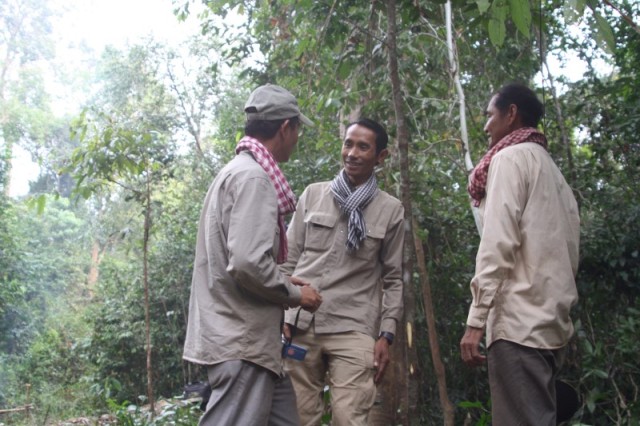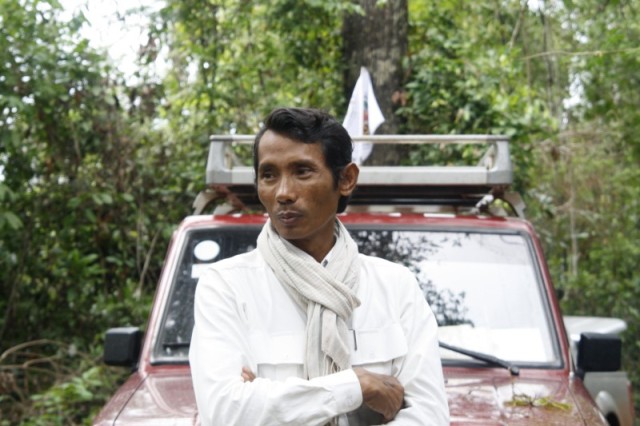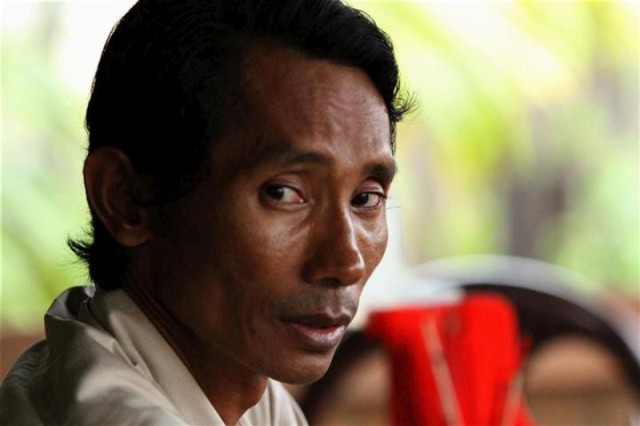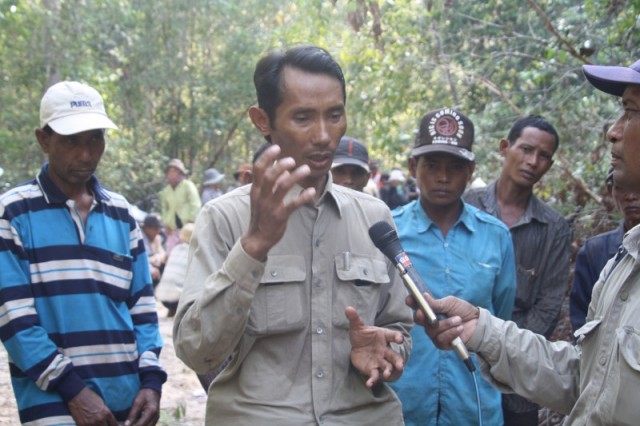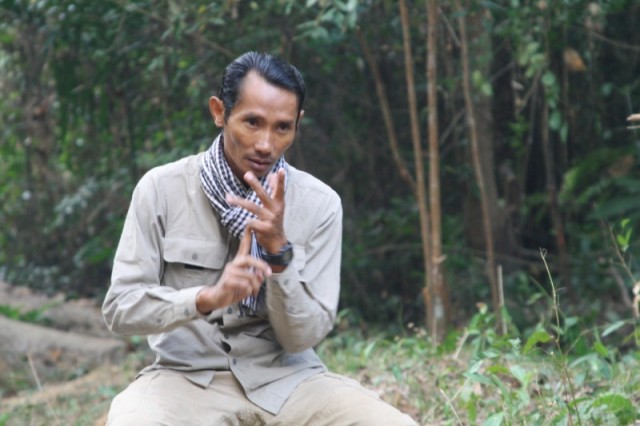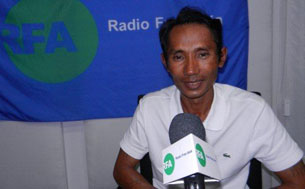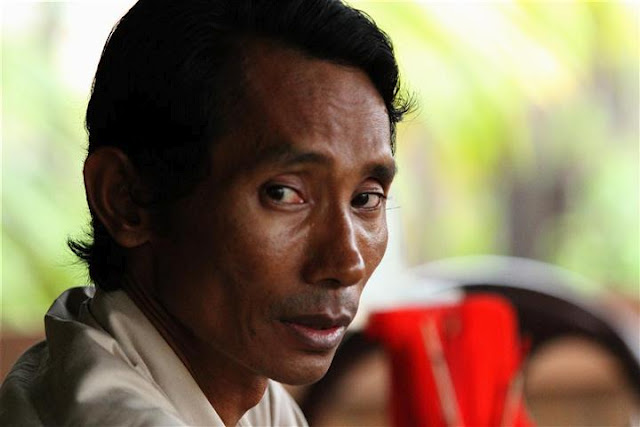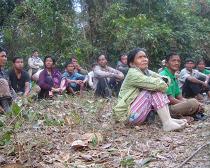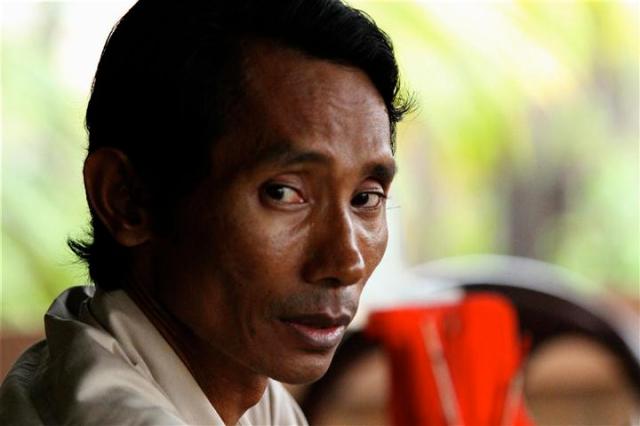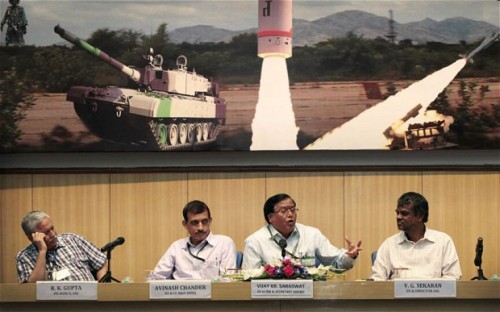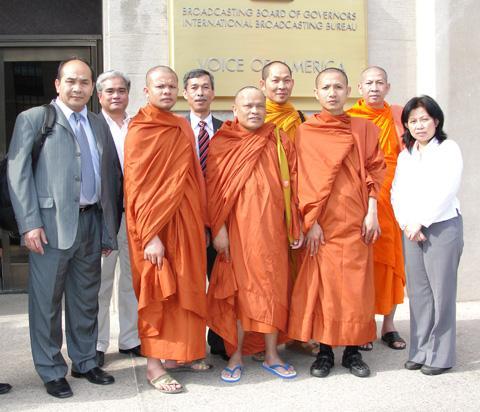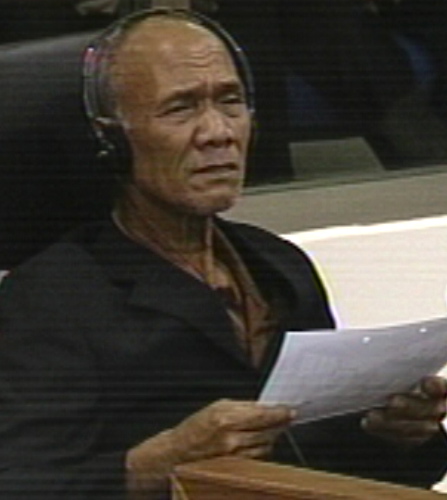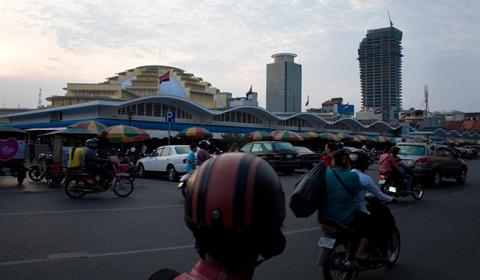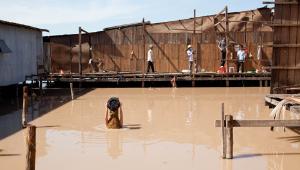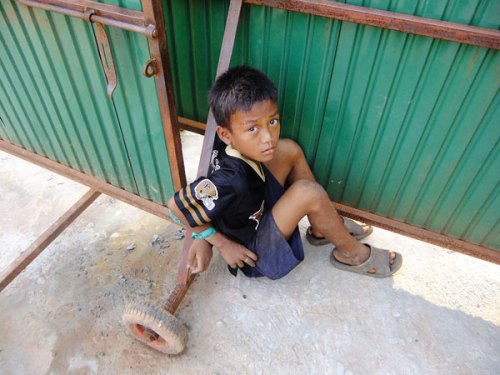 |
| A truck loaded with illegally cut rosewood passes through Russey
Chrum village in Koh Kong province’s Thma Bang district on Sunday night
in the Central Cardomom Protected Forest. Moments after the photograph
was taken, the photographer was confronted by a group of five RCAF
soldiers who demanded the images be deleted. WILL BAXTER |
 |
| A man dressed in RCAF military fatigues watches over a cache of
rosewood at a weigh station in Koh Kong province’s Thma Bang district on
Sunday. WILL BAXTER |
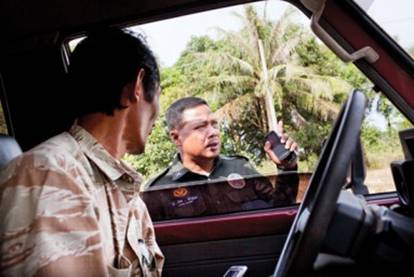 |
| Military police official Chhorn Samol detains two journalists from
the Post and conservationist Chut Wutty on Monday. Will Baxter |
 |
| A migrant worker stands next to a motorbike and rosewood stump. Will Baxter |
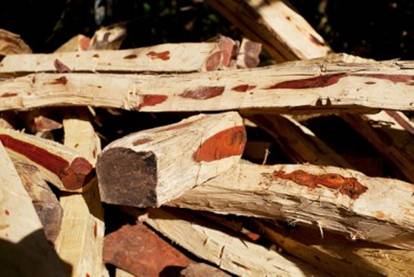 |
| A cache of illegally cut young rosewood timber is concealed at a
weigh station guarded by an RCAF soldier in the Central Cardomom
Protected Forest in Koh Kong province. Will Baxter |
 |
| Forestry Administration and military police officials conduct a
day-time ambush on small scale illegal loggers on a road in the Central
Cardomom Protected Forest. The officials admitted that they do not
conduct ambush operations during the night-time, when the vast majority
of illegal logs are trucked out of the protected area. Will Baxter |
Wednesday, 21 December 2011
David Boyle with additional reporting by Yi Somphose and Cheang Sokha
The Phnom Penh Post
Illegal logging of staggering proportions abetted by
military personnel is decimating stocks of luxury rosewood in the
Central Cardamom Protected Forest, while the conversation group tasked
with protecting the area and its government counterparts deny the trade
is even happening.
In a period of several hours beginning late on Sunday night, the Post
witnessed at least nine industrial transport trucks, seven pick-up
trucks and one Land Rover packed with timber drive out of Koh Kong
province’s Thma Bang district in the CCPF on one road alone. Large
numbers of trucks could also be heard using a nearby connecting road.
Several of the trucks that the Post was able to inspect closely were carrying heavy loads of illegal rosewood.
Villagers, loggers and conservationists have verified that Forestry
Administration officials, military officers and rangers working in
partnership with the NGO Conservation International are making no effort
to stop the massive trade in protected rosewood.
In many cases, it is alleged, they are actively profiting.
Thuy Pet, 50, a former soldier from military division 5 now living in
Thma Bang district’s Russey Chrum village, estimated that during peak
logging periods, anywhere from 80 to 90 trucks carried timber out of the
protected area every night.
“I think nobody can stop this until they finish. When they finish, they will go to another area,” he said.
Another villager, who spoke on the condition of anonymity, said that about 2,000 people were now logging in the area.
“Residents used to be farmers, but now they’ve become loggers because of money,” he said.
Chut Wutty, director of the Natural Resources Protection Group,
estimates that tens of thousands of dollars worth of rosewood, which
fetches between US$5,000 and $8,000 per cubic metre, is being
transported out of Thma Bang district every day.
“This area is the last area in Cambodia [with any rosewood]. They’ve
destroyed Ratanakkiri, Mondulkiri, Bokor National Park, Pursat – after
that, they went to O’Som [commune]. After that, they went to Thma Bang,”
he said.
In four or five months, stocks of rosewood would be exhausted in Thma
Bang district, at which point, previous experience suggests, the
loggers will turn their attention to lower grades of timber, Chut Wutty
said.
The 402,000 hectare CCPF is one of the largest conservation areas in
Cambodia, covering six districts across Koh Kong, Pursat and Kampong
Speu provinces.
It is considered to be one of Indochina’s richest conservation areas
in terms of biodiversity, with vast numbers of endemic Cambodian flora
that supports populations of pangolins, Asian elephants, Siamese
crocodiles and other endangered or threatened species.
A conservation researcher who has worked extensively in Thma Bang but
declined to be named, said the district was just one of four sites
within the CCPF where tens of millions of dollars of rosewood had been
cleared by companies abusing licences which only grant them permission
to clear areas intended for dam reservoirs.
“It’s like a gold rush – the value of rosewood is so high, it’s irresistible for cutters and middlemen,” the researcher said.
“It’s all relatively organised, how much the loggers and middlemen
have to pay, and to whom. They know which checkpoints they have to go
through. It has apparently reached the stage where most young men in
Tatai Leu commune [in Thma Bang district] have been absorbed into the
rosewood extraction.”
Military personnel swarm Russey Chrum village in Thma Bang district,
an almost endless procession of 4WD vehicles rolling in and out of town.
They are matched only in number by the torrent of heavy transport
trucks that clumsily rumble through the village during the day on their
way to and from the forest.
While investigating the trade, Post staff were stopped on two
occasions by military police or soldiers claiming to work as security
guards for a company the men refused to identify.
Both times, the journalists were threatened with arrest and ordered
to delete photos of trucks carrying illegal rosewood. The soldiers
refused to explain why.
On the second occasion, military police set up a road block to apprehend the journalists in order to delete their photos.
Migrant loggers
About two kilometres from Russey Chrum village, situated on a small
side road, a group of about 60 migrant loggers from provinces such as
Pursat and Kampong Speu have cobbled together a makeshift camp of
tarpaulins and cooking stoves. From there, they make daily forays into
the nearby mountains in search of rosewood stumps, which they sell for a
small profit.
Three months ago, Chhay Sengheng left his family in Kampong Speu
province and headed to the Cardamom Mountains in search of a better
salary. Previously, he had earned 20,000 to 30,000 riel per day as a
builder.
Now he ventures every day far into the surrounding mountains searching for rosewood stumps left by previous logging operations.
“Of course, it is quite difficult to go away from the family, but we
have no choice, we have to support our livelihood,” he said.
Chhay Senghy estimates that in the previous three days alone, one to
two tonnes of rosewood had been trucked out of Thma Bang from his site.
No one has told him it is forbidden to take rosewood out of the CCPF.
No more than 10 minutes down the road, a thick pile of young rosewood
timber lies poorly hidden next to a weigh station overseen by a man
dressed in a Royal Cambodian Armed Forces uniform, and surrounded by
RCAF paraphernalia.
Standing beside a set of scales, a buyer, who declined to give his
name, said he paid 1,500 riel per kilogram of rosewood stump. He would
not say to whom or for how much he sold the timber or where the young
rosewood planks had come from.
“I’m just a worker,” he said.
Mysterious Company
Villagers, forestry officials, buyers and commune officials in Thma
Bang district all say rosewood in the area is bought by “a company” that
no one is able, or willing, to identify.
Chut Wutty alleges that company is Timber Green, a firm he says is
paying villagers and workers employed for a separate project to cut
rosewood in the CCPF.
“They always say they are clearing for hydropower, but they are not,” he said.
“You can see it is a big amount. I think [what is happening] in the Cardamom Mountains, I’ve never seen as big as this.”
Several sources have identified Timber Green as the logging company
licensed to clear a reservoir area that will be created by the
completion of the Stung Tatai dam on the Tatai river – about 30 km away
from Russey Chrum village.
Construction of the 246-megawatt Stung Tatai Hydropower Dam by the
firm China National Heavy Machinery started in January this year.
CI country director Seng Bunra said Timber Green had been employing
villagers to cut logs within the dam area, but denied they had expanded
logging into the forest area his organisation is tasked with protecting.
“This [company] in Thma bang district in Koh Kong…[they] only clear on the reservoir,” he said.
He claims that a small number of individual workers had then gone on
to illegally clear logs in the CCPF by themselves. However, the reaction
of military officials to the photographing of illegal logs suggests a
coordinated operation is being tightly controlled by a single company.
At 11.25pm on Sunday, five military personnel, two carrying assault
rifles, stepped out of a Toyota Camry with no licence plates and
surrounded two Post journalists who had just photographed a pick-up
truck inside the CCPF that was packed with young rosewood.
They claimed it was illegal to take shots of the vehicles because they belonged to a private company.
After demanding the photographer clear one of his memory cards, the
men returned and passed a mobile phone to Chut Wutty, who entered into a
protracted and heated conservation with a man he says identified
himself as the security chief of the company Timber Green.
When a Post reporter called the man’s phone and asked if he was the
security chief of Timber Green, the man asked “what’s wrong?” and hung
up when questioned further.
Timber Green is not publicly listed and could not be reached for comment.
Enforcement or endorsement?
Just outside of Russey Chrum village, five military police and
forestry administration officials sat around a fire cooking tarot roots
while waiting in ambush.
Forestry Administration ranger Sou Sophal says they were there to
catch loggers, but not the trucks carrying tonnes of rosewood. Instead,
they’re going after individuals on motorbikes.
“All the trucks that transport timber are licensed,” he said.
When asked which company was licensed to log in the area, Sou Sophal
said: “I don’t know the name of the company because I am under my
superior, but I think it is licensed.”
He added that ambushes were not even conducted at night – when the
overwhelming majority of trucks carrying illegal timber in Thma Bang
operate.
Sou Sophal’s patrol group are part of a CI-coordinated protection
program that incorporates the Forestry Administration and military
police and was set up inside the CCPF in 2000 and officially recognised
through a sub decree in 2002.
The anonymous researcher alleges that officials working with CI
stationed at a checkpoint on road 48 – the only avenue out of Thma Bang –
are allowing trucks carrying rosewood to drive straight through in
exchange for “taxes”.
“In practice they have turned a blind eye to illegal activity in the
CCPF, allowing the FA and loggers to cover up and continue what is going
on, for the sake of political convenience and expediency,” the
researcher said.
Two weeks ago, when the Post interviewed CI country director Sen
Bunnra, he denied that any large-scale, coordinated logging was taking
place in the CCPF.
“I think to me, it’s not true, unless the government has allowed this
company to clear,” he said. “Normally, anywhere Conservation
International works in the world, we always be very careful about the
corruption, we also follow up if we suspect someone involved in the
corruption.”
Seng Bunra could not be reached for comment yesterday and a man
answering the phone of CI regional director David Emmett hung up on a
reporter before switching his phone off.
The anonymous researcher concedes CI is in a difficult position,
acting against powerful individuals that have strong connections to a
government intolerant of NGOs that are publicly critical, but questions
at what point they become a self-defeating entity.
“It’s a massive challenge and it’s a fine balance, but international
conservation NGOs should not be ‘green washing’ for the Cambodian
government or the FA,” the researcher said.
“One of the key issues here, which makes the case stand out from
other forest areas in Cambodia, is that you have a big international NGO
that is receiving funds from international donors to protect the
forest.”
Meas Chan, 42, the chief of nearby Pruch village, downplayed the scale of illegal logging in his area.
“When they [the company] come and want to buy [timber], if the
organisation says the forest will be affected, we cannot do. But if they
say it’s not affected, we can do,” he said.
Tip of the iceberg
Stung Tatai is not the only dam clearance project in the Cardamom
mountains in which CI has been implicated in mass illegal logging
operations.
In 2009, Ouk Kim San, a Forestry Administration official working for
CI, was arrested after he was caught unloading tens of thousands of
dollars worth of luxury timber at the Vietnamese border in Takeo
province.
The timber haul was connected to a CI forest protection program near
the Stung Atai dam, where the company MDS Import Export was licensed to
clear timber from the reservoir area.
Contact details for MDS, which is owned by tycoon Try Pheap, could not be found.
Jeremy Ironside, a consultant with conservation group Flora and Fauna
International who has worked in Koh Kong’s O’Som commune since 2002,
said instead of doing their job, MDS had simply cut rosewood from
surrounding protected forests.
“They came in on the pretense that they were going to clear the
reservoir, but basically all they did was clear all the rosewood out of
the forest. I didn’t see any of the clearing of the reservoir,” he said,
adding it was not profitable for a company to clear dam sites.
Since then, he alleged, nothing had changed within the organisational culture of CI or the Forestry Administration.
“The close involvement of conservation organisations with resources
extraction in that area is pretty astounding,” he said. The anonymous
researcher said between $40,000 and $80,000 worth of illegally cut
timber was being trucked along four roads leading out of the CCPF from
O’Som commune and Russey Chrum, Roleak Kang Cheung and Mongri villages,
straight past CI checkpoints every day.
“If you come to Cambodia to do conservation, you might as well do conversation,” the researcher said.



